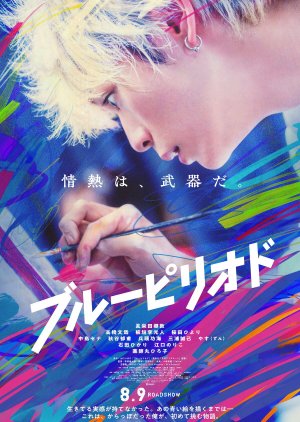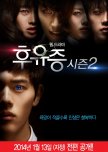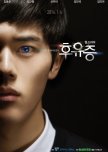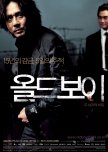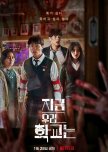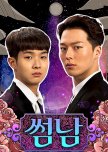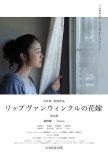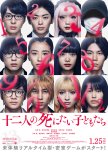
"Your lines are your emotions"
If you imagine a rabbit is blue then the rabbit is blue. Adapted from a manga, Blue Period was a gentle coming of age story about a high school boy going through the motions until he discovers his passion. I have not read the manga so my review will be based solely on the film.High schooler Yaguchi Yatora excels at academics and after classes hangs out with his three best friends. Life would seem to be perfect, but he’s merely going through the motions. He finds no meaning or thrill in his days until he’s forced to take an art class. In one blue moment, he discovers his zing and something that makes life worthwhile. He throws himself into his artwork, fighting to make up for a lack of natural talent with determined enthusiasm.
Full disclosure, this kind of film is my jam. I am a frustrated artist and love watching other people perform miracles on paper and canvas even when it is fictional. This was not a film with twists and turns, in fact it was quite predictable. Yet I still enjoyed watching Yatora’s artistic journey as well as his internal journey. Forever comparing himself to others and lacking in confidence, Blue Period explored his steady growth as an artist and as a young man. This film was far from perfect, but for me it was soothing and motivational
The supporting characters were given little time. Ayukawa Yuka (Ryuji), a young transwoman, received most of the attention outside of Yatora. For the most part, the writers were sensitive and showed the prejudice she faced especially within her own family. I disliked how Yatora continued to refer to her by her masculine name instead of her chosen name, other than that he strove to be a friend to her. And Yuka gave him the advice and push forward he often needed. The other supporting characters were there to fill in the canvas.
Blue Period had no villains except for the brutal inner critic that lives within all of us. Yatora came to understand that regardless of how “flimsy and pathetic” people appeared to be, everyone deserved to be loved. Through his art, Yatora began to really see the people and world around him. He learned to stop comparing himself to others and focused on his own path that held mistakes but also wonderful bursts of insight and creative innovation. Inspiration is contagious…pass it on!
"They can't create what I can, a world all my own."
11 July 2025
Was this review helpful to you?

Watch Blue Period for Inspiration, but Don’t Expect Perfection
Blue Period tells the story of Yatora, a high school student excelling academically but feeling unfulfilled in life. When he unexpectedly discovers a passion for painting, he embarks on a journey to pursue art despite the challenges ahead.First off: as someone unfamiliar with the original Blue Period manga or anime, the story was entirely new to me, so I may view it differently than fans of the source material.
The Good: The soundtrack is fantastic and fits perfectly with the film's emotional tone. There were some creative choices I found intriguing, especially the use of CGI to visualize the main character's imagination—it added an extra layer of immersion. The storyline includes some inspiring, motivational moments that stick with you and the artwork featured throughout the film is absolutely beautiful.
The Not So Good: At times, the story felt a bit predictable, following a familiar path. It’s also clear that this is an adaptation, and unfortunately, some characters don’t get enough screentime for their motivations to come through clearly. As a result, their actions can feel underdeveloped, which makes it harder for the audience to connect with them. In my opinion, the directing and editing were occasionally uneven, leading to some awkward transitions. Lastly, while some actors stood out with strong performances, others didn’t quite hit the mark.
Overall, Blue Period delivers an inspiring coming-of-age story with stunning visuals and a solid message, though some narrative and pacing issues hold it back from fully reaching its potential.
Was this review helpful to you?

Minority Misrepresentation
After viewing the picture, I wanted to read the original source. Surprisingly, the film conveyed a very complete picture in 2 hours. Yes, this is a movie, even though the script contains a plausible life of a schoolboy who is mired in a feeling of emptiness, despite the slight fabulousness, in life there are miracles when in a year you can become someone.The picture is of high quality in technical design: paints, light, color, angle, special effects, sound design.
Psychological side: the theme of emptiness in the human personality, hiding oneself in the box of a socially useful/pleasing personality. Lack of confidence in your abilities due to various circumstances.
Accepting yourself and your personality in the environment....
All this, to some extent, the hero is restoring a picture called “I”, but I don’t think that the process has a final version.
I really liked this whole part and I’m ready to re-watch it for this BUT!
I don't know if this is a feature of Japanese cinema or what, but the representation of minorities here is grossly flawed.
First, the main character deadname a transgender person. The heroine clearly identifies herself as a woman, so the “otomen” version is excluded by itself, secondly, in the original source she also positions herself as a woman. But then the manga and the film begin to have problems.
I started looking for an interview, although she did not go into detail, but the mangaka seemed to have outdated wording of descriptions and understanding of the “phases” of transgender people, rather, at what age does awareness begin in connection with modern access to information. The heroine is not a child and clearly distinguishes herself based on this.
I could not understand why throughout the entire film she did not directly express to the hero that she did not like it when he deadnamed her. Moreover, they already had a dispute about psychological constraint. The characters had quite a few opportunities to discuss this issue, but it was neither made nor corrected in the film.
What is even more highlighted in the film is that the hero and she, like twins, almost seem to go through the question of establishing themselves as individuals in a social environment, with the struggle to do what makes them alive. Her drama was even very intensified by the moment when she could no longer follow the path that her beloved grandmother had chosen for her, but not she. And in a strong scene where the hero and she reveal their soulmate to each other, the hero deadname her.
Reading the reviews, I realized that such mistakes in films, when it is clearly visible that the creators did not even bother to clearly find out from the representatives of the minority themselves whether they are representing them correctly, misinform the audience. And without understanding anything on the topic, they mix their personal views or rumors with labels and partial lies about minorities, confusing the viewer.
Which is why some argue that this is an otomen, while others explain that this is a transperson. After all, the author herself and the filmmakers mixed all these concepts in one. When she communicates with the hero, otomen. When she introduces herself as a woman, she is already a transperson.
In my opinion, if cinema today has decided to use the most vulnerable part of the planet’s population for the sake of highlighting drama, then this cinema should, at least for the sake of respect, consult on the correctness of representation. And not to imagine how they heard from third parties, analyzing such a sensitive issue through their heteroconsciousness.
Was this review helpful to you?

will increase your life quality at once...
watch this movi whenever u feel upset or need motivation.this represent all of us in our daily life struggling with comparison , negative impulses and feeling miserable to the point that weay start copying others creatures , behavior , beliefes and styles because we think we are not as good as them to reveal ourselves and whatever they do is th best.
his development start once he self-examined and start to figure out what he actually like and who he actually is ...
after watching , you'll find yourself much more confident and all your talents, beauties, creativeness and exclusiveness
will come up..
Was this review helpful to you?

Maybe you will find your answers....
I watched Blue Period first as a movie and then as an anime, and I wasn’t prepared for how deeply emotional this would feel. The manga may hold even more detail, and the anime breathes life into every brushstroke, but the movie alone carried so much heart.It didn’t just tell a story. It stirred something I thought I had buried.Plot**
The story follows Yaguchi Yatora, a well-liked high school student who gets good grades and seems to be doing everything “right.” But inside, he feels empty. He studies hard, he performs well, he fits in yet nothing feels like his. Everything shifts when he encounters the students of the school art club and is asked to paint his favorite landscape. He chooses to paint Shibuya in blue at dawn, and that one painting changes his entire life.
Through art, he discovers not just talent, but meaning.
Watching Yatora fall in love with painting felt like watching a memory of myself. The first time you truly see shadows. The first time, colours blend exactly how you imagined.
The moment a blank canvas stops being intimidating and starts becoming a possibility. It was so painfully nostalgic.
I could almost smell the oils again. Feel the stiff neck from sitting for hours. The back pain from leaning too long over a drawing board. The silence of a studio filled only with scratching pencils and heavy concentration. Unless you’ve lived it, it’s hard to explain how physical art can be, how it takes over your body as much as your mind.
This movie didn’t just show the beauty of art. It showed the obsession. The doubt. The exhaustion. The hunger to be better.
And the imposter syndrome! That thing; It hit hard.
Because there is something terrifying about loving something so much and then realising how many people are naturally better than you.
Watching Yatora work himself to the bone, not because he was born a genius but because he refused to give up, made my chest tighten. That kind of determination is inspiring… but it’s also painful to watch. You see his effort. You see his fear. You see the cracks in his confidence.
It reminded me that talent isn’t always magical. Sometimes it’s built slowly, painfully, through tears and late nights.
The feeling of finding something that suddenly makes sense. That moment when your whole life shifts direction because you discovered a passion you didn’t even know you were missing. It’s like learning a new language, and realising it’s the only language that truly sounds like you.
Then reality steps in.
Entrance exams. Competition. Financial pressure. Society constantly questioning your choices. The quiet voice in your head asking, “Are you really good enough?”
Blue Period doesn’t romanticise art. It shows how hard it is to choose something uncertain. How vulnerable it feels to care that much. How scary it is to build your future… this movie made me want to pick up my sketchbook again.
This story felt personal. Like it reached into a place I hadn’t touched in years and gently said, “You remember this. You remember how it felt.”
And I do.
I think this movie will speak to you, maybe in the same way it spoke to me, or if you didn’t grow up in art, I still think it will move you. Because at its core, it’s not just about painting. It’s about passion. It’s about that moment when something clicks inside you, and suddenly you want to try harder. To push yourself further. To take your dreams seriously instead of just admiring them from afar.
It’s the kind of manga, anime, or movie that gives you a feeling you can’t fully put into words. Not just inspiration, something deeper. Something that lingers. It doesn’t scream motivation at you. It sits quietly in your chest and makes you reflect.
Maybe it will make you pick up a brush, or maybe it will make you practice your craft more seriously, or maybe it will just remind you why you started in the first place.
But it will give you something. And sometimes, that “something” is magical.
Was this review helpful to you?

This review may contain spoilers
As a fan of the Blue Period anime I think the movie took unnecessary liberties with some of the characters like Ryuji and Yatori's 3 best friends. That being said the movie still overall follows the themes of the anime. I haven't read the manga so I am not sure how different the movie is from that. Maeda Gordon is actually perfectly cast as Yatori. I really liked his performance. The scene with Yatori and Shin at the pastry shop and the scenes with Yatori and Ryuji were very well done and we see the growth of those characters in those moments. Takahashi Fumiya played Ryuji and he was absolutely stunning. Another great performance by him as well. However, I feel like his character's arc was rushed.
It's a better movie in my opinion if you haven't watched the anime. If you have seen the anime you can't help but compare and find the inconsistencies and flaws. It's worth a watch, all the same though.
2/25/25
Was this review helpful to you?

This review may contain spoilers
"Many Are More Talented Than I Am, But They Can't Create What I Can."
I haven't seen the anime so I had no preconceived notions of what this movie should be or shouldn't be. I just knew that art is a central theme, so I basically went into this blind. I suppose it was a good thing I didn't watch the anime or read the manga because I actually really enjoyed this. I might have judged it in comparison to the anime/manga if I had been a fan of the source material.Yaguchi Yatora is the central figure in this story, a relatively ordinary teenager just trying to conform to society's expectations, to be a good student and make his parents proud but careful not to stand out or seem too geeky that he'd be ostracized by his peers. In other words, his life revolves around fitting in and pleasing other people save for himself. Because of this, he has never once felt like his own person or discovered what he really wants to do with his life until he stumbles upon Mori Maru's art and ignites something deeply provocative in him, compelling him to reflect on his own existentialism. And so he embarks upon the challenging journey of seriously pursuing art despite the fact that he has little to no talent and has to start from scratch, competing against far more skilled and gifted artists than he is. The movie follows him as he struggles with his own perfectionism and suffers blow after blow to his self-esteem, and yet continues to be determined to try again until he reaches the pinnacle.
Yes, the plot is simple and fairly predictable. It doesn't attempt to do the unexpected and you know where the protagonist's journey ends. But it's not the destination that matters here, it's the many obstacles and moments of self-doubt along the way that the plot focuses on. It's a moving character-driven story that explores the complexities of human desires and the lengths one is willing to go through to achieve them despite the hardships, pain, and humiliation. Every time Yaguchi fails and ponders upon giving up his dream, I feel it, I can relate to it. Gordon subtlely but expertly portrays Yaguchi's sadness and frustration, so kudos to him. But I must admit, he was overshadowed by Fumiya's portrayal of Ryuji. I never thought a complex cross-dressing character could be so beautifully and poignantly portrayed by anyone, let alone Fumiya. I wasn't a fan of his before this, but I've been completely converted. He should be given meatier roles like this. He is perfect for Ryuji! I found their beyond-friendship dynamic profoundly compelling. The movie actually reminds me of The Lines That Define Me but with a better ending, better visuals, a more inspiring story, and more complex characters.
The production value in this is also highly commendable. The special effects are way cooler than I thought they would be. I imagine that in the anime/manga, Yaguchi's imagination and creative reveries are depicted in fantastical visuals that transport the viewer/reader to an alternate world that exists inside his mind, and the movie does well in adapting that into live action. And damn, the cinematography is chef's kiss! The color grading and filters, especially the bluish hues they chose to depict Shibuya's early morning cityscapes, really bring out the somber beauty of Tokyo. I felt like I wanted to be there, I was there, and should be there. Even the subtle details of trash littering the streets and drunk teens smoking on sidewalks give authenticity to the place, something that is rarely shown in dramas or movies that aim to only present the pleasing aspects of a place.
I have to talk about the music because I seriously think it's the best part of the movie. The soundtrack/musical score is a cultural experience by itself! The music is practically the gravitational force that brings it all together. The funky and jazzy song that plays in the first few minutes of the movie immediately sets the artsy tone. The music remains consistent throughout the film, announcing its presence when you're supposed to notice it and toning things down when it's supposed to stay in the background like inconspicuous white noise. It's certainly one of the best soundtracks in any Japanese drama or movie I've seen thus far. Very well done indeed!
My only complaint is that it's too short and left me wanting more. I felt that this could've worked better as a short drama instead of a two-hour movie. The characters could've used more fleshing out. I found myself getting attached to the main characters but the side characters felt like fodder. I wanted to get to know them more. I bet the anime does better at this.
Thanks to this movie, I no longer have any reason to sleep on the anime. I will definitely check it out! I give Blue Period a solid 9 out of 10.
Was this review helpful to you?

 1
1